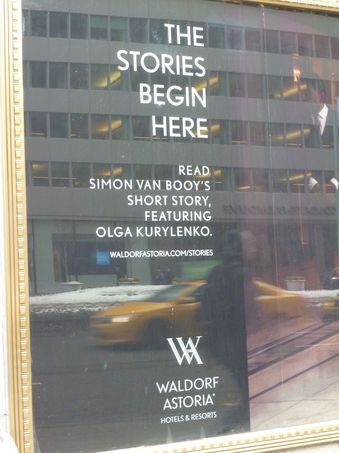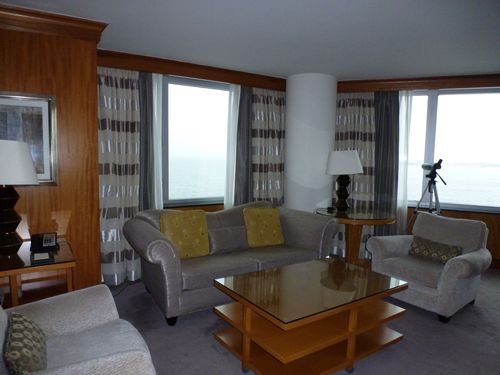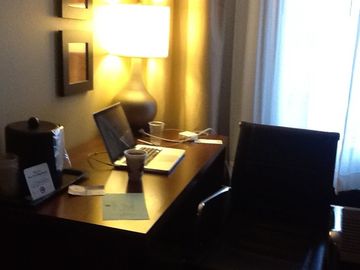|
I love nice hotels. I also like slightly less nice hotels as long as I get to stay for more than one night. The miracle of even crummy, cheap, roadside motel type hotels is you leave for a few hours during the day, and when you come back, it's all clean and nice and new again, and you get to start over. There's something very perfect about that. Plus it's a pretty good metaphor. More often than you'd think, I set scenes in hotels. My first book opens in the Waldorf=Astoria (equal sign theirs) where I just went for the first time on a research expedition for novel number three which also opened there but doesn't anymore for reasons not clear to me until I set foot in the place. Also fodder for another day. Outside, there was this sign: which probably wasn't actually a directive from the universe to me but certainly felt like it. It's a gorgeous old hotel. Then there's this gorgeous new(er) hotel which I also visited for book research: the Ritz-Carlton New York, Battery Park (whose hyphen, let's admit, is a little passé). A scene I was writing hinged on the view from a suite in the hotel, so I needed to see a suite in the hotel and look out its windows. It was pouring rain in NYC, and I was wandering around in only a raincoat and hat because I am a Seattlite now apparently, and so a forecast of rain no longer suggests to me that I should bring an umbrella. Thus I showed up in the lovely empty lobby of this very posh hotel, soaked and dripping and bedraggled and asking politely to see and photograph a $1500 a night hotel room. The concierge was quite, quite skeptical. I explained as to how I was writing this book and really it would take only a minute and I promised not to even drip on anything. And he paused and looked askance and went and whispered with someone else and looked tempted to call security and looked tempted to throw me out and looked somewhere between alarmed and appalled at my very existence and said, down his nose, "I don't suppose you have a card or anything." I do. I fished around in my wallet and produced it for him. And a switch flipped. Suddenly, he was terribly solicitous and all smiles, very eager to help, very kind, delighted to take me up and let me into a room that was maybe one hundred times lovelier even than it had been in my imagination. Generally they require a permit for photos he said but I should feel free to just go ahead and take as many as I pleased. You understand I ordered these cards online. And you could too. They aren't certified by the Library of Congress or anything. This is the sort of reception one hopes will greet the revelation that one is writing a book. And it never, ever happens. So I was gratified. And as an aside, if you've the means, the suites at the Ritz-Carlton seem entirely worth $1500 dollars a night in my opinion. And they do keep out the riffraff. "This telescope is provided for your enjoyment while a guest at this hotel. Should you wish to take it home with you, a $1,000 dollar surcharge will be added to your account." (I am just kidding. Probably if you pay $1,500 dollars a night for a hotel room, they throw the telescope in for free. Like how it's implied in your $99 a night hotel room that you may take your leftover shampoo if you wish.) In fact though, the case I want to plead is for the opposite kind of hotel room. I did a couple book events recently at a wonderful bookstore called Auntie's in Spokane, Washington. Spokane is so far east of Seattle it's very nearly in Idaho, and its hotels were all booked so I stayed a bit out of town, even easter, maybe only eight or ten feet from the border in a Comfort Inn which cost not even 100 dollars a night and was exactly what you are imaging. And it was perfect. In New York City, it doesn't matter how nice your hotel room is -- there's too much else good on offer to spend very much time there. In between Spokane and the Idaho border? I think there was a Subway down the street where I could have hung out, but otherwise nothing. So I sat in the room and wrote. All day. The room was spacious and neat and comfortable with a nice big window (overlooking the parking lot), climate control free and at my fingertips, a large desk and chair, free wifi, a TV in case I needed a break, a bed in case I needed a nap. Just downstairs was a hot tub, a workout room, a pool so I could have a little (very little, but still) swim. When I finished availing myself of these, I returned to a newly clean room, newly made bed, sparkling bathroom. Breakfast was plentiful and included and did not even require my putting on shoes (I did. But I didn't have to.) plus hot coffee and tea all day long plus soup in the late afternoon plus cookies in the evening. It was quiet and interruption/distraction/temptation free. For $99 a night, you could do a lot worse in the way of a writing retreat. There's much ado these days about romantic writing retreats -- on the train, say -- and though I get the romance, a train is going to be much more cramped and loud and public and distracting and with way grosser bathrooms and a much flimsier desk than one's very own hotel room. For me the only wrinkle is that Practically-Idaho is a solid five hours from Seattle, and though the ride there had been 60 degrees and sunny and so I'd put the top down on the convertible, when I left to go home, it was 35 degrees, and I could not get the top back up. And having packed for the former -- and for being in the car besides -- I'd not even brought a jacket. FYI: car heat does not stay in your car at highway speed if you don't have a roof. Strange but true. It was a long, cold drive home. But a good writer's retreat. A trade I am always willing to make.
I've taken a little break from blogging about writing books in order to actually write books, a good trade as far as I'm concerned, but it's good to exercise the blog-muscle too. (Or really any muscles -- I also exercise somewhat less when I'm in the writing throes than when I'm in the prepping-for-writing-throes. My agent's point, and it's a good one, is, "Everyone can exercise. Not everyone can write." Fair enough.) Also we adopted a puppy from this very great shelter (should you find yourself in the greater Seattle area and craving a pet) called PAWS. Does everyone want to see a picture of said puppy, even though really she's a subject for another post? Of course you do. ANYWAY, the point of this post is not to look at puppy pictures nor to recommend a book but -- wait for it -- a book review. Never in my life have I recommended a book review. Never in my life has anyone recommended a book review to me. I can't recommend the book because I haven't read it yet. But the review, well, the review blew my mind. It's by Katie Roiphe for Slate on a new novel called The Blazing World by Siri Hustvedt. (Is it bad form to link an entire sentence? Whatever.)
I like Katie Roiphe though boy does she piss people off. Which is some of what I like about her. She started off pissing people off -- that is, she remains most famous for her first book, The Morning After, which argued (in 1993) that that statistic you hear that one in four female college students will be raped at school is a load of shit. She further argues that saying so does everyone a tremendous disservice and that saying to women who had sex when they wished they didn't that it wasn't their fault because they were drunk or felt bad basically keeps women second class citizens. What has always impressed me about this book is not the argument itself but that she wrote it in grad school while getting a PhD in English. Getting a PhD in English seems like it should have something to do with writing books, but it really doesn't, especially not this kind of not-about-literature book. Her writing this book during graduate school seems to me about as impressive as learning a foreign language during the World Series. I will also say it was timely and provocative, and too little is. She writes for Slate now, as well as other publications as well as other books, about a whole variety of topics, which itself has been criticized as selling out in some circles, that she was going to be this feminist academic powerhouse and instead is writing memoir and book reviews and thoughts on parenting and marriage (because really, what kind of feminist cares about self, books, parenting, or marriage? Jeez.) Anyway, this is a person who both can't win for losing and wins big time for losing, so even when I disagree with her -- she wrote an article once about how ridiculous parents are to get so worked up when their kids won't sleep and she just lets her toddler wander around her apartment all night -- I am challenged and intrigued. And challenged and intrigued are good. I will also point out the obvious which is two-fold: 1) much of the problem with her being edgy, provocative, critical, dismissive, judgmental, and prone to not giving a shit what other people think of her is that she's also female (as are her harshest critics). And 2) as you will recall from the start of this sentence, even though that's obvious, I feel the need to point it out. All of which is to say: when Katie Roiphe says stuff, you'd do well to give it some thought. And in this book review, she wonders whether, "in coming years, the most provocative work in feminism will be in novels....It may be that the challenges currently facing feminist thinkers, the subtleties of how sexism plays out...are better dealt with in fiction. Now that we no longer need to name or discover it--'Sexism exists!'--the flatfooted outrage...is too crude, too simplifying, too unchallenging, too predictable, and the novel's delicate touch may be precisely what is called for." (Bold ecstatically mine.) How great is that? Like many in my generation, I came to feminism early and without question. Then I read a thousand pounds of feminist theory in grad school from which I learned a lot of history but a very little praxis. My search therefore has been where to go from here. We've ferreted sexism out, but my generation has neither done nor said very much new about it. Roiphe's point is ferreting it out -- pointing to it, linking to it, blogging about it, lecturing about it, non-fictioning about it -- has proven insufficient. So perhaps fiction is the feminist way forward. Novels are how the message progresses and minds are changed and consciousness is raised and change occurs. Novels, AS ONCE THEY WERE, will be again where the new, smart, strong, provocative, important, political, timely things are being said on this front, said and heard and germinated. My own bias is for novels anyway. I am entirely a proponent of fiction being more true than non-fiction (after all, you can make it up). I have never had to be convinced that fiction matters and matters most of all, the case for which is a feminist one both historically and critically anyway. And still this seems revelatory to me. This makes me stand up and cheer! Who gets to carry the feminist mantle into the next wave? Novelists! To which I say: a) hell yeah and b) I'm so on it. |
About The AuthorLaurie Frankel writes novels (reads novels, teaches other people to write novels, raises a small person who reads and would like someday to write novels) in Seattle, Washington where she lives on a nearly vertical hill from which she can watch three different bridges while she's staring out her windows between words. She's originally from Maryland and makes good soup. Archives
October 2023
Categories
All
|




 RSS Feed
RSS Feed